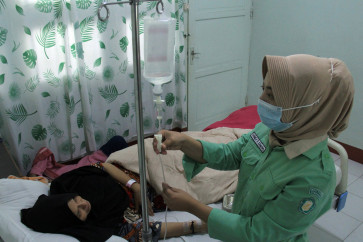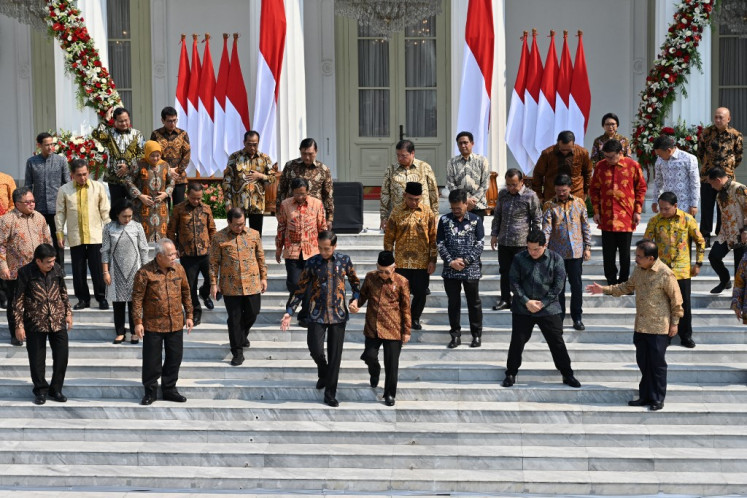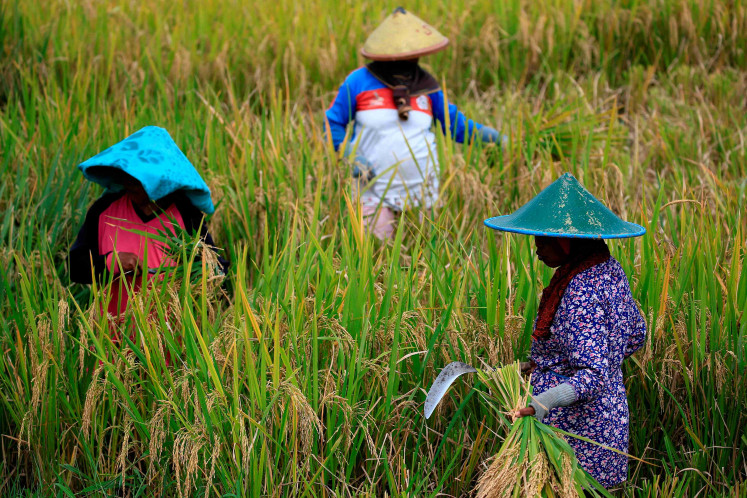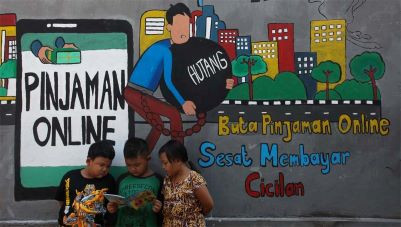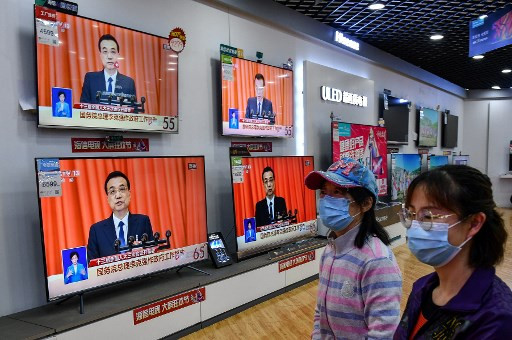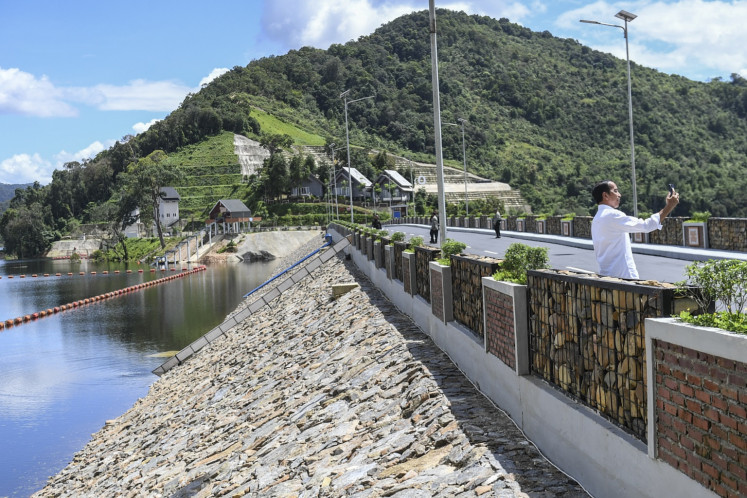No way to ‘stay home’ without decent home food and cash
Textbook economics says “people respond to incentives”, thus understanding the incentives and constraints of communities in following the PSBB is vital. Therefore, the success of this policy likely depends on three micro-aspects of households: food access, household savings and housing conditions.
Change Size
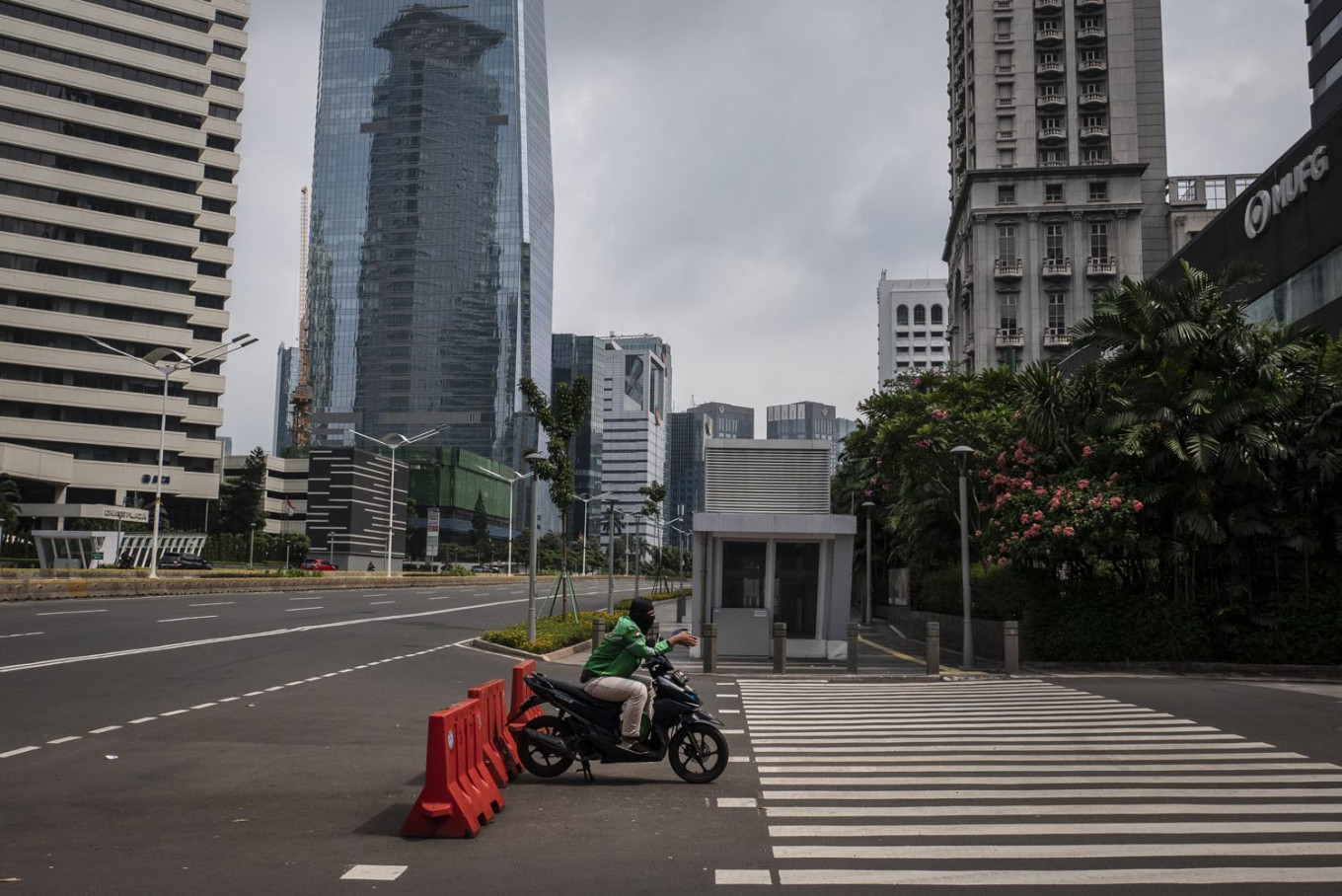 A motorcycle taxi driver waits for orders in the business district on Jl. Sudirman on April 26.
(Antara/Dhemas Reviyanto)
A motorcycle taxi driver waits for orders in the business district on Jl. Sudirman on April 26.
(Antara/Dhemas Reviyanto)
O
ne of the central policies for addressing COVID-19 is physical distancing. The effectiveness of Indonesia’s large-scale social restrictions (PSBB) requires not only government resources and capabilities in implementing it but also adequate community responses.
Textbook economics says “people respond to incentives”, thus understanding the incentives and constraints of communities in following the PSBB is vital. Therefore, the success of this policy likely depends on three micro-aspects of households: food access, household savings and housing conditions.
Unfortunately, not all Indonesians have access to these three things simultaneously; many lack all three. In Jakarta, some of the jobless and homeless have slept on store-fronts.
Read also: Survey finds Bandung residents more afraid of job loss than COVID-19
Other provinces outside Jakarta have reported a significant jump in confirmed positive cases as people lacking food, savings and shelter are still trying to head home, mainly from Greater Jakarta, to at least get free shelter and food at home, despite a ban on this year’s Idul Fitri mudik (exodus).
The availability of food, savings and housing is the major incentive for people to stay home. Food access depends on supply or availability and the demand side or purchasing power, which in turn depends on savings.
The pandemic has disrupted the distribution of supplies, particularly from production centers to urban areas. Some regions have adapted to this change, such as Jakarta with its food aid program and Yogyakarta with night stalls providing free food called Sonjo Angkringan.
Two crucial issues of household savings are how many households have savings and whether funds saved in whatever form prior to the pandemic would cover basic needs, especially for daily casual workers who are furloughed and those laid off.
Our estimates based on the 2018 National Socioeconomic Survey (Susenas) published by Statistics Indonesia (BPS) reveals that in urban areas, only 37 percent of the population has a savings account and only 21.3 percent in rural areas.
For provinces that apply the PSBB such as Jakarta, 48.28 percent of the population has a savings account as of 2018, much higher than barely 32 percent in West Java, which started its PSBB on May 6.
Meanwhile, the BPS Household Balance Sheet reports that in 2015-2017, households of employed persons had 9 percent of their total revenue reserved for savings. The poorer households would have much lower figures for savings, if any.
Adequate and safe housing condition becomes an incentive for citizens not to leave the house, as well as important factors in reducing the COVID-19 transmission within households. Do the homes have enough space and rooms, enough sanitation and handwashing facilities? Is it a rented accommodation or one’s own house?
Read also: COVID-19: Govt plans to loosen PSBB regulations, starting with transportation
While authorities scold people for not remaining indoors, the above BPS survey showed that in Jakarta, the average housing size among the poorest is 5.9 square meters per capita, with over five family members under one roof, often with one bedroom. Self-isolation for COVID-19 positive persons with mild symptoms, as authorities advise given currently overwhelmed health facilities, is virtually impossible within such houses, which lack space and ventilation.
And while the government spokesperson for COVID-19 reminds the public daily to frequently wash their hands with running water and soap to avoid catching the virus, the 2018 Susenas shows that up to 24 percent of the poorest lack handwashing facilities, inside or outside the house.
The most severe conditions are in Jakarta, the epicenter of COVID-19, of which 30-43 percent of poor households lack handwashing facilities with flowing clean water and soap. Outside Jakarta, over 40 percent of poor households in cities and worse, 55 percent in rural areas, lack access to clean running water for handwashing facilities.
Even more vulnerable are individuals and families in rented accommodations. During the pandemic, with harsh economic and employment conditions, urban households face the risk of tenants failing to pay rent
and tenants fear being kicked out. In Jakarta, according to the 2018 Susenas, 35-45 percent of poor households lived in rented spaces.
Read also: COVID-19 creeps into Jakarta's kampungs
“The lockdown is not the same for everyone,” is one phrase written on many viral memes about COVID-19. The inequality in access to food, shelter and savings presents the needs for a comprehensive and targeted policy on urban poor families. The government has been on the right track by prioritizing social assistance, although there might be room for improvement regarding beneficiaries and allocation amounts.
A comprehensive yet region-specific policy, which considers urban/rural features, requires medium- to long-term intervention, not only from the social assistance side but also from a focus on housing infrastructure and other micro-aspects of households. For example, integration of social aid with housing improvement assistance is crucial.
The current pandemic brings us back to one of the chronic unsolved problem of successive governments: the need to prioritize decent, affordable and healthy housing. Such vital social infrastructure, apart from access to clean water and qualified health services, would empower communities to face the current and possible future health crises.
***
Rusli Abdulah is a researcher with the Institute for Development for Economics and Finance (Indef), Sandy J. Maulana is a researcher with Article 33 Indonesia, which focuses on social policies.


